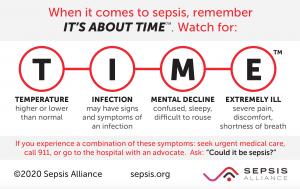September is Sepsis Awareness Month
September is sepsis awareness month, but few people outside of healthcare are aware of all the signs that could indicate this potentially life-threatening medical emergency.
So, what is sepsis? It's when someone’s body has an overactive and toxic response to an infection.
According to the Sepsis Alliance, “Your immune system usually works to fight any germs (bacteria, viruses, fungi, or parasites) to prevent infection. If an infection does occur, your immune system will try to fight it, although you may need help with medication such as antibiotics, antivirals, antifungals, and antiparasitics. However, for reasons researchers don’t understand, sometimes the immune system stops fighting the ‘invaders,’ and begins to turn on itself. This is the start of sepsis.”
Though some populations are at higher risk, such as those with impaired immune systems, anyone can develop sepsis. With that in mind, it’s important for everyone to understand the warning signs and what to do about it.
The acronym T.I.M.E. is helpful in remembering four important signs of Sepsis: Temperature, Infection, Mental decline, and Extremely ill.

Temperature can refer to a fever, any body temperature over 100 degrees Fahrenheit. However, some people’s temperature can go down instead. So, it’s important to note any changes in temperature.
Next is infection. Most people will know if they have a localized infection, such as a urinary tract infection, pneumonia, or an infected cut. But there are also infections you may not know about and may not show symptoms of. These hidden infections can be from a virus or an invasive medical procedure.
Mental decline is exactly what it sounds like: changes in a person’s mental status. Those with mental decline might not show typical signs of infection, but could be confused or have extreme sleepiness. Those with dementia might also show a worsening of dementia-like symptoms.
Last is extremely ill. Essentially, someone with sepsis will feel completely awful and can have severe pain and discomfort and/or shortness of breath.
Another reason the acronym T.I.M.E. is important to remember is that time itself is critical. Early detection of sepsis is essential in combating the reaction before it becomes fatal. Those who survive severe sepsis can even have life-long issues and must maintain regular doctor visits.
Because early detection is essential, if you think you have sepsis, go to your local Emergency Department immediately. Providers will be able to test you for it and give you treatment if you’re diagnosed.
Anyone can get sepsis, however, there are steps you can take to prevent infections that may cause it.
First is to get vaccinated. Vaccines help your body fight off or even prevent viral infections.
Next is to thoroughly clean wounds. Any cut, scrape, or break in the skin can cause a bacterial infection.
If you do have a viral or bacterial infection, keep track of your symptoms. Early warning signs of sepsis may include not getting better, getting worse, and/or developing new symptoms.
If your doctor prescribed you any medications such as antibiotics, it’s important to follow the prescription’s directions and to finish the full course.
Finally, perhaps the easiest and most important infection prevention tool, is handwashing. Anyone, including children, can and should wash their hands. Handwashing is particularly important to do before and after eating, after using the bathroom, after blowing your nose or coughing, and after coming home.
Sepsis is considered a medical emergency, and it’s important to get treatment as quickly as possible. However, there are several ways to prevent infection from happening in the first place and keep you living a healthy and happy life.